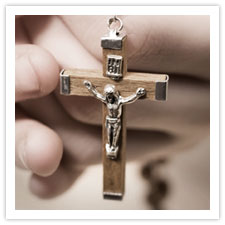 Courtesy Catholic Climate CovenantCiting dual obligations to care for God’s creation and the world’s poor, a broad coalition of Catholic groups today announced a new commitment to take action on climate change.
Courtesy Catholic Climate CovenantCiting dual obligations to care for God’s creation and the world’s poor, a broad coalition of Catholic groups today announced a new commitment to take action on climate change.
The “St. Francis Pledge,” named after the patron saint of animals and ecology, urges Catholics to pray for those affected by climate change, learn about the problem, and take steps to reduce their own consumption and advocate for climate legislation that protects the world’s most vulnerable people.
“Our cars and power plants, more energy consumption and waste—we’re leaving a bigger carbon footprint,” reads a statement on the website of the umbrella group, the Catholic Climate Covenant. “Scientists tell us that means more climate change. Here and around the world, it is the poor who will be hit hardest. With more droughts, floods, hunger and joblessness. As faithful Catholics, we have a moral obligation to care for both Creation and the poor. Pope Benedict XVI insists, ‘Before it is too late, it is necessary to make courageous decisions’ to curb climate change.”
The group printed a similar message in an ad [PDF] on the New York Times op-ed page today. The campaign’s participants include the United States Conference of Catholic Bishops; Catholic Charities; the Catholic Health Association of the United States; Catholic Relief; the National Catholic Education Association; and the Conference of Major Superiors of Men and the Leadership Conference of Women Religious.
“What brings all these groups together are the Biblical call to be stewards of God’s creation and Jesus’ mandate to care ‘for the least of these,’” Bishop William Skylstad, the campaign’s honorary chair, said in a prepared statement. “This prophetic connection in the life and example of St. Francis has fresh meaning for our response to the crisis of global climate change.”
The pledge does not endorse specific legislation or suggest specific personal actions, although it seeks to include measures to protect the world’s poor in U.S. climate legislation. (Check out the campaign’s video on its site or below.)
Neither does the campaign mention birth control, long a contentious issue between Catholic leaders and those environmentalists who believe population growth must be curbed. A reporter asked about population control during a conference call with organizers today. Bishop Skylstad said the global population was less important to the earth’s climate than the amount of resources humanity uses.
While environmental stewardship has deep roots in the Catholic Social Teaching tradition, evangelical Christians have made more news in recent years in advocating for and against action on climate change. (Grist’s 2006 special series on God & the Environment found much more hubbub on the issue from evangelicals.)
The emphasis in today’s announcement on the “least of these” who will be most harmed by climate change also jibes with Pope John Paul II’s widely quoted message from 1990:
“When the ecological crisis is set within the broader context of the search for peace within society, we can understand better the importance of giving attention to what the earth and its atmosphere are telling us: namely, that there is an order in the universe which must be respected, and that the human person, endowed with the capability of choosing freely, has a grave responsibility to preserve this order for the well-being of future generations. I wish to repeat that the ecological crisis is a moral issue.”
Pope Benedict XVI mentioned “disturbing climate change” among his concerns in his Easter message to the world last week.
Here’s the video version of the campaign announcement:
Grist’s Kate Sheppard contributed to this story.



